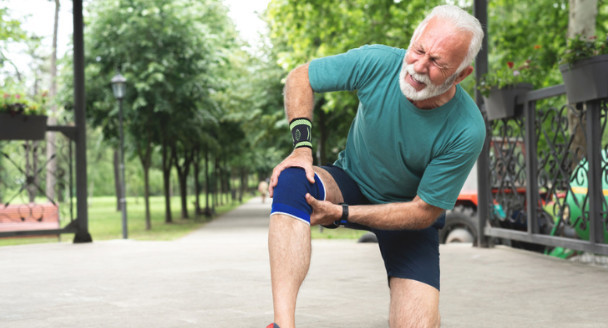
How Your Chiropractor Can Help with Knee Pain
Wondering what you can do about your knee pain? Whether your symptoms are recent or you're suffering from chronic pain, all-natural chiropractic care can relieve your symptoms and improve your mobility.
Why Visiting the Chiropractor Is a Must if You Have Knee Pain
So many things you do depend on strong, healthy knees. Climbing stairs, bending to pick up a fallen fork, or even sliding behind the driver's seat of your car become painful and difficult when your knees are sore and stiff.
Although knee pain occurs for many reasons, arthritis is a common cause. Knee osteoarthritis cases have doubled since the middle of the last century, according to a 2017 research article in PNAS. The article's authors believe that the increase in knee arthritis could be happening because people today live longer and weigh more.
Other causes of knee pain include:
- Meniscus Tears
- Rheumatoid Arthritis
- Torn Anterior Cruciate Ligament
- Runner's Knee
- Tendinitis
- Bursitis
- Osgood-Schlatter Disease
- Iliotibial Band Syndrome
- Flat Feet or Excessive Pronation
Knee pain isn't always due to an injury or arthritis. A subluxation (misalignment of the vertebrae in your spine) could be the reason why your knee hurts. Subluxations in your back can lead to misalignments of the bones and joints in your hip and legs. You might have a subluxation if you have both back and knee pain, or you notice tight hamstring muscles or weak muscles in your hips or thighs. Back pain might also cause you to change the way you walk, which could affect your knees and the muscles that support them.
Your chiropractor offers a variety treatments that may relieve your pain, including:
- Ice. Inflammation, stiffness, and swelling are common in knee conditions ranging from arthritis to sports injuries to meniscus injuries. Icing your knee offers a simple way to reduce inflammation, pain, swelling, and stiffness. Your chiropractor may apply ice for a few minutes before beginning other treatments.
- Joint Manipulation. Applying gentle pressure to the knee realigns the joint while reducing pain and improving your ability to move your knee.
- Massage and Soft Tissue Mobilization. The muscles that support your knee can become tight and painful if you have a knee condition or injury. Massage and soft tissue mobilization loosen and stretch tight muscles, improving mobility and reducing pain. These therapies are also helpful in treating painful muscle spasms in the muscles surrounding your knee and improving blood flow. During soft tissue treatment, your body releases hormones that ease pain and help you feel more relaxed. Massage therapy improved pain and range of motion in people with knee osteoarthritis in a 2012 study published in PLoS One.
- Electrical Muscle Stimulation. Electrodes attached to your knee carry a mild electrical current that strengthens the muscles around the knee, blocks pain signals from reaching your brain, reduces inflammation, and increases the production of endorphins.
- Spinal Manipulation. Spinal manipulation treatments correct subluxations in your spine. Your chiropractor uses quick thrusts from his or her hands or an activator to restore normal spinal alignment. Once your spine is properly aligned, you may begin to notice less pain in your back and knees. Spinal manipulation also loosens tight muscles and tissues that may pull on your knee.
- Ultrasound Therapy. Ultrasound waves heat the deep tissues in your knee, reducing inflammation and pain, while speeding healing.
- Orthotics. Flat feet or excessive pronation, a condition that happens when your feet turn in too much when you walk and stand, could be to blame for your knee pain. Wearing orthotics, shoe inserts designed by your chiropractor, can help. The inserts support your arches and keep the bones in your legs properly aligned.
- Trigger Point Therapy. This therapy releases tight muscle fibers that cause painful knots in your muscles. Applying pressure to the knots breaks up the fibers in the trigger point. Massage and dry needling are other techniques your chiropractor may use to relieve trigger points. Dry needling involves placing thin needles into the trigger point to release it.
- Exercises. Your chiropractor may recommend exercises that will help you improve your range of motion and keep the muscles in your legs strong and flexible.
Are you tired of living with knee pain? A visit to the chiropractor could improve your comfort. Give our office a call to schedule your appointment with the chiropractor.
Sources:
PNAS: Knee osteoarthritis has doubled in prevalence since the mid-20th century, 7/12/2017
https://www.pnas.org/doi/10.1073/pnas.1703856114
PLoS One: Massage Therapy for Osteoarthritis of the Knee: a Randomized Dose-Finding Trial, 2/8/2018
https://pubmed.ncbi.nlm.nih.gov/22347369/
Arthritis Foundation: Chiropractic Care for Arthritis
Medical News Today: What Causes and Links Lower Back and Knee Pain?, 3/31/2023
https://www.medicalnewstoday.com/articles/lower-back-and-knee-pain
Arthritis Foundation: Change the Way You Walk to Ease Knee Pain with Osteoarthritis, 1/4/2017
http://blog.arthritis.org/osteoarthritis/knee-pain-oa-walking/
